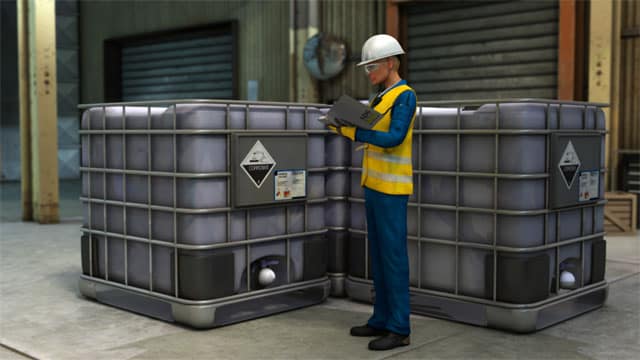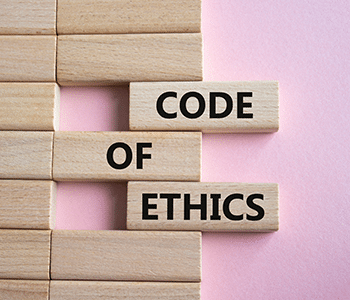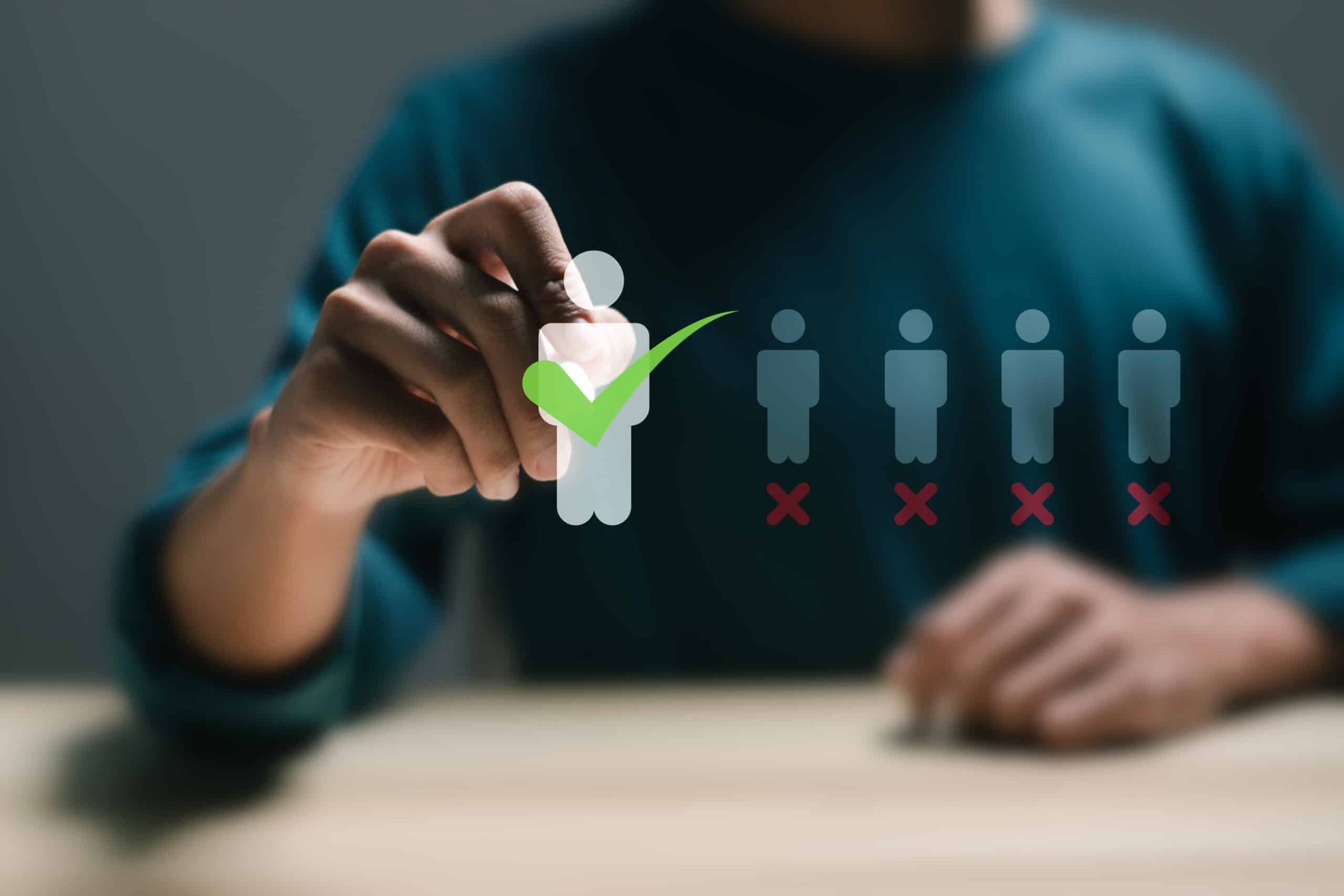August 4, 2019 30 min read
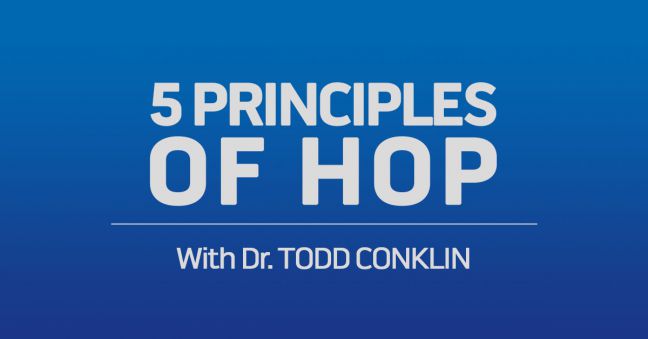
5 Principles of Human and Organizational Performance (HOP) with Dr. Todd Conklin
Industry:
Solution:

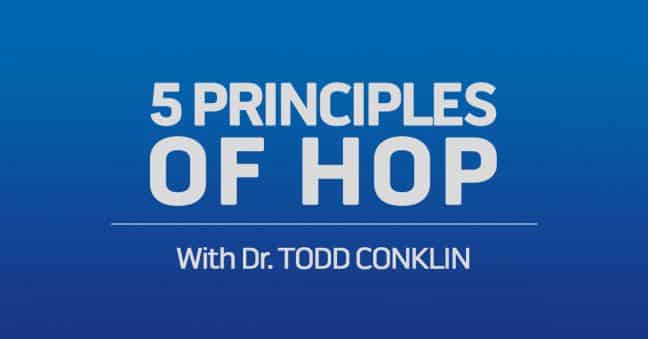
One of the most influential, most innovative, and most controversial thinkers in occupational safety and health these days is Dr. Todd Conklin, who’s famous for his human and organizational performance (HOP) approach to safety matters.
It’s likely you’re familiar with Dr. Conklin and don’t need me to explain to you who he is. However, if the name IS new to you, you might want to check out his Pre-Accident Investigation podcast series, or his HOP Hub website, or his books on pre-accident investigations, learning more by asking better questions, preventing workplace fatalities, or the 5 principles of human performance, which is what our discussion below will focus on.
Todd was nice enough to stop by for a chat with us and explain the 5 principles of HOP and some other HOPpy stuff, and we can’t thank him enough. We’ve included an audio recording of the discussion below and hope you enjoy it.
(Note: If you’re the type who’d rather read than listen to an audio, the transcript is below).
Also, feel free to check out some of the articles we’ve written about Dr. Conklin’s books, below:
- 9 Things to Know about HOP
- Using Learning Teams after Workplace Incidents
- Preventing Workplace Fatalities
Plus, we’ve got some HOP-related downloads for you:
5 Principles of HOP
Get started with human & organizational performance (HOP).
Yes! I Want this Infographic!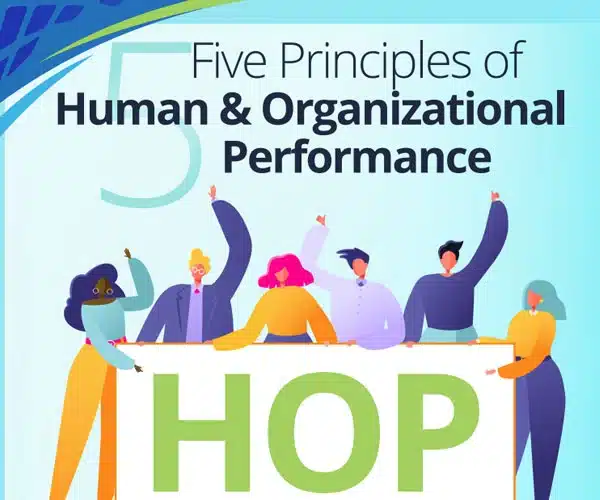
Five Principles of HOP with Todd Conklin
Let’s get right to this discussion of HOP and its five underlying principles with Todd Conklin.
Convergence Training:
Hello, this is Jeff Dalto of Convergence Training and Vector Solutions. And we have a special guest on our webcast series here, this is Dr. Todd Conklin. Todd is a very well-known human and organizational performance consultant, and he’s here to talk to us about HOP and five principles of HOP.
Todd, how are you doing today? Thanks for coming in.
Dr. Todd Conklin:
I’m good. How are you?
Convergence Training:
I’m good. It’s exciting to talk to you. I appreciate it.
Dr. Todd Conklin:
I know it was almost impossible. We did the unthinkable, the unseeable, the unknowable, we broke the technology.
Applying "New Safety" Guide
HOP, Safety Differently, Safety-II, Resilience Engineering, HPI & More from Many Global Experts
Yes! I Want this Guide!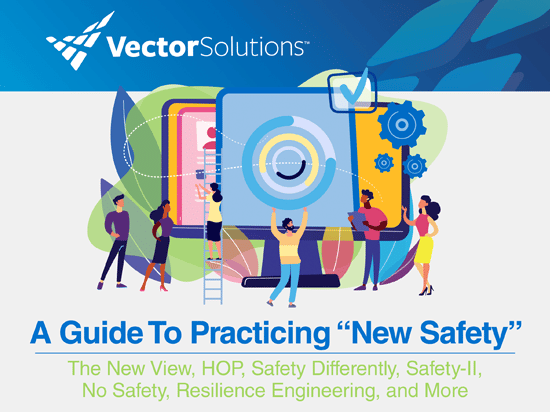
The Todd Conklin & HOP Origin Story
Convergence Training:
Well, you know, we haven’t finished yet, so we’ll see. But it’s looking good so far.
And I wonder–you’re here to talk to us about HOP and these five principles of HOP, which we’re excited to hear about. But I wonder for people who maybe aren’t familiar with you or with HOP, if you could just kind of start by telling us a little bit about yourself and how you came to be a HOP consultant.
Dr. Todd Conklin:
So I spent 27 years working at Los Alamos National Laboratory. And I worked in, really, the human performance side of the house, pretty much all 27 of those years. And around..man, I was trying to figure out the time of this…probably around 2000, there was a push in the nuclear community through an organization called INPO (the Institute for Nuclear Power Operations), to start a program that looked at human and organizational performance effectiveness (I think there’s an S on it, too, I can’t remember). But we started looking, at the time, at the place and at the interface where work meets worker.
So we did a pretty good job in reliability terms in understanding human behavior. And we had a crap-load of behavioral observation programs and ways we could manage workers individually. But individual interventions are good. The problem is it means you’re managing really technical, very significant, highly critical facilities, one worker at a time. And that’s a little tedious and not terribly impactful.
Then we got into process safety, and started looking at design and human factors. And we focused a lot on the system, and how we could make the system more reliable. And that was really valuable too. We fixed a lot of things that were kind of wonky and potentially risky, that had high failure modalities to it.
It was around 2000, that we started looking not at the individual worker and worker behavior, or not at the system and human factors, we started looking at the coupling between the worker and the system. And that’s when we started looking more collectively, or maybe systemically, at how work was happening. And in the early days, there weren’t a lot of people to go to. James Reason had been doing it probably since about, well, probably the early-90s. But he just put a book out on organizational failure in the late-90s. And that sort of lit high-critical, high risk-work on fire. And gave us something new to look at.
And that’s kind of the origin story of where we came from.
So I was working industrial organizational, that’s what my PhD’s in. And so it was a kind of a good fit for me. It was a place to use classic organizational development skills, and understand critical high-risk operations, and try to find places to make that fit in in between there. It was a pretty successful journey. It was really fun. I had no idea it would end up being a career. As many of the people who listen to you will tell you, it started out as a special project. And special projects can either be good or bad. Lots of times they’re bad. This one ended up being pretty neat. And it certainly had a future to it. And that kind of started our trail. And it was fun. We had a really good time.
Read an introduction to systems thinking here.
Traditional Safety & HOP
Convergence Training:
Alright, good origin story, Batman. Thank you. Yeah, that’s, that’s cool. And I also have a career that I did not intend to be a career, I think that’s kind of common.
So HOP is often used in safety. And maybe before we start talking a little bit more about HOP, why did we need some kind of alternative to traditional safety?
Dr. Todd Conklin:
Um, I think the quick answer is that we saturated our current processes with all the traditional approaches. That we’d really probably done as much as we could do with behavioral observation.
Behavioral observation has kind of a flawed assumption. Well, actually, maybe two flawed assumptions, one’s much more egregious than the other.
The first flawed assumption is that somehow, bad things happen because people are bad. We just didn’t find that to be the case. I mean, it’s just not the case.
The second flawed assumption it makes is that behavior is a choice. And then if you simply choose to do the right thing, you would never have any accidents. The problem with that is that it’s really hard to adjudicate what right is and when we adjudicate what right is and who adjudicates what right is.
So that was kind of, I don’t know…we’d probably gone about as far as we could go in that angle. That’s going to make people angry. But I’m relatively certain that you could observe people all the time, and you’re still having people. I mean, they’re incredibly capable of solving hard problems, but they’re not terribly reliable. If you’ve ever been on a date or had children, you know that.
Then we sort of got to a point where compliance was limiting as well. So compliance is really great. It sets the standard. It tells people what right and wrong is because that’s hard to adjudicate. We talked about that. The problem with compliance is, it’s limited and that more compliance doesn’t equate to more safety. So one rule that says don’t poke your eye with a stick is a pretty good rule. Three rules isn’t three times safer.
So that’s it. Those two things kind of did what they could do. And we got great improvement. I mean, if you look at an industrial safety in the United States, there’s been remarkable improvement in the last fifty years. I mean, incredible improvement. We’re now kind of in that Pareto curve, the last 20%. That’s, that’s hard. And in a way, you could probably draw it on a process chart, it’s kind of an asymptotic curve. We started going down, we’re super close to perfect. But we can’t seem to crack that last part of the perfect trip.
What Makes HOP Different?
Convergence Training:
Gotcha. So, I like the two points you made about how bad things happen to good people. And how about decisions, and we’ll get back to those in just a little bit.
So if that was, I guess, the problem with safety, and we’re getting to the point of diminishing marginal returns of traditional safety, in a quick, brief overview, how is HOP different? How is HOP going to address this?
Dr. Todd Conklin:
HOP really moves us…traditional safety looks down and in, and HOP looks up and out. So if you really had to give an elevator speech, HOP asks what failed, and classic, traditional industrial safety asks who failed?
Convergence Training:
So I love that not looking down and in but looking up and out point you just made. I just repeated that in a webinar yesterday, and I thought people really got that.
And what you’re talking about is instead of being—and tell me if I’m wrong–instead of being somebody investigating an incident who’s trying to see, with all the information after it happened, look back into time and find some point where a human made an error and identify that and label that as human error. Instead, you’re saying, get yourself in that perspective, look out and try to see why that decision made sense to the person at that time. Is that correct?
Dr. Todd Conklin:
Yeah, I mean, the quick advice I would give everybody is don’t limit yourself for the quest for human error, because you’ll always find it. The crazy thing about human error is every failure that happens has human error. But every success that happens has human error. Error is really not very interesting. It’s a part of the operational fabric that always exists. When a failure happens because of human error, the error is not the problem. It’s the lack of tolerance in the system that’s the problem. We can expect the error to happen, and we should build systems that are tolerant enough to be able to manage sort of that kind of variability.
The Five Principles of HOP We Promised We’d Tell You About
Convergence Training:
Okay. So with that, and moving into our discussion of these five principles of HOP, you just published a brand new book, and I haven’t had a chance to read it yet. Could you tell everybody a little bit about that book, what its title is, and tell us a brief overview of these five principles?
Dr. Todd Conklin:
So I think it’s called isn’t it called The Five Principles of Human Performance?
Convergence Training:
I think so. I thought you’d be the expert on that question.
Dr. Todd Conklin:
I honestly don’t know and I don’t have it in front of me.
Yeah, it’s got a nice cover. It’s got Jenga on it, that’s good.
(Side note: Yes, it’s called The Five Principles of Human Performance and you can buy it right now and then come back and finish the rest of this interview).
So I really looked at five. So when human performance started, INPO, again, they come into this story, they created five principles for human performance. And the initial principles they created, this is again in about 2000, were in conjunction with a guy named Tony Muschara and James Reason (so his name comes up again). And they sat down and said, “What are the five truths, the five sort of foundational first principles that exist in operational reliability and resilience?” And they wrote these five very succinct principles that, in fact, were very, very important. They’re foundational for sure, to the development of human performance as we know it today.
But those principles at the time, were written really, when Erik Hollnagel and Sydney Dekker had not really looked at and talked about things like Safety 2; David Woods and his resilience team at The Ohio State University really hadn’t formed yet. So resilience engineering, sort of new safety, those terms didn’t exist. So the initial five principles were really pointed at the worker. And were really contingent upon managing worker error. Because initially, human performance was really a program that was set aside to fix the worker. It was created to sort of manage human error. And so over time, those principles became, what’s the word I’d want, Jeff? They didn’t become inaccurate, they’re still very much first principles. They just became dated in the way they were silent on some of the more contemporary, neo-modern notions around safety.
And so I thought, maybe it’s time we look at those founding principles, and keep the principles intact. In fact, the book starts with the original principle at every chapter, and then it sort of introduces a new, more contemporary language, use of the principle, and a new, more contemporary definition of what the principal most likely means now, in a world where safety is no longer the absence of accidents, safety is the presence of capacity.
And so we took those principles and looked at them carefully. And we did this over quite a period of time, and talked about them with lots and lots of people, and decided we could take those principles and give them sort of a memorable rejuvenation, not really a change, because they didn’t change very much at all, but just kind of make them live through the lens of this new safety. And so we looked at the five principles, and they’re really simple.
HOP Principle One: Human Error is Normal
The first one is the fact that human error is normal. And what we discussed there is that systems that aren’t tolerant of normal error, systems that are poorly designed, because a system should have enough latitude in it, so that when a worker zigs instead of zags, the consequence of that is detection and correction, not catastrophic failure.
And highways are a great example of that. And the thing I would ask is, why don’t we make roads exactly as wide as cars? Well, the answer is, they would be cheaper to make, they’d be incredibly efficient, but they’d have zero ability to manage any type of variability at all. And so if anything happened, you’re off the road. So what we do now is make roads that are quite a bit wider than cars. And we put rumble strips and shoulders on these cars. So that when variability happens, we don’t know when the variability will happen, we don’t even know what will happen. But when it happens, we have enough space, margin, latitude…
Todd and I lost our connection here and had to call again.
Dr. Todd Conklin:
And all that is capacity, right? So they build all that capacity into a highway system, because they know variability is expected. They don’t know what will be variable, they don’t know when it will be variable. But when it happens, they know that the variabilities…it’s normal, I mean, it’s a part of what happens.
That’s how we have to build systems and processes at work, too. So you don’t want to do a really important job in a system that has no room for failure. Because if you remember from your resilience engineer training, two equals one, and one equals zero, right? So two systems equal one system, one system equals no system. So you always want to build resilience, robust recovery, flexibility, all those things you could sort of add up to equate to the word capacity. I’m not sure capacity is that good of a term. But it’s kind of a collective understanding of all the values that exists in a system that’s very resilient.
You want to go to a restaurant today, and it’s Friday, you want to go to a restaurant with lots of capacity to serve good food. You don’t want to go to a restaurant that has, you know, one steak, and if they overcook it, or burn it, you can’t have steak, right? You want that extra capacity built into the system.
And human error is really interesting, because as organizations go on this journey, error is really attractive. I mean, it’s super sexy, and the belief that you can somehow either manage error or manage the places where errors happen, and make a really stable system is a part of the developmental path and changing to the new view. The problem is that eventually, the longer you work in this field, the more you realize that in fact, error is so normal, it’s not very interesting. And it’s never causal. It’s a part of the fabric of all operations, good and bad. And it’s just normal. I mean, it’s…ask somebody who’s done safety a really long time, and worker error…it’s not a stopping place, and it’s not terribly important. I mean, it just isn’t.
HOW the error happened, but more importantly, how we got into a system where the outcome was possible, those become really desirable questions.
HOP Principle Two: Blame Fixes Nothing
Dr. Todd Conklin, Continued….
But to talk about error, you first have to talk about principle two, which is weird, because maybe it should be principle one. But it wasn’t, it wasn’t in the original INPO document. Principle two is really simple: blame fixes nothing. Now, had I rewritten the book today, I wonder if I would change blame fixes nothing, which is kind of on its surface, relatively negative and a little preachy. I wonder if I would change it to a phrase that sounded more like this: blame stops improvement.
Same thing, right? I mean one is just a little bit more impactful. The crazy thing about blame, is that blame is emotionally satisfying in kind of a Nietzschean existentialism way. But it’s not incredibly valuable. In fact, every second an organization spends blaming a worker is a second of that organizations time they’re not using to analyze the system and really looking forward at improvement. Blame really does stop improvement. And blame is really, really difficult to manage. Because we’re hardwired to go in and say the worker screwed up, a better worker would have done something, I wouldn’t done something differently, and blends emotionally satisfying. I mean, it allows us to punish the guilty, and blame’s cheap, because it’s very inexpensive to ask workers to be more careful, and blame’s easy because it means we don’t have to rework our systems or rewrite our procedures or policies or rules or regulations. The problem is, is all of those things don’t equate into becoming better. And so principle two really is foundational to principle one, because ultimately, blame makes error feel like a choice. And air is not a choice, it’s an unintentional deviation from an expected outcome. Error is error, and blame is blame. And when you start to separate the two, that’s when organizations start getting better.
HOP Principle Three: Learning Is Vital
Dr. Todd Conklin, Continued….
The third principle is that learning is vital. So if you asked me to define operational excellence, which is a term people are tossing around like crazy, operational excellence is probably the new safety culture. It’s a term you hear all the time, I would define operational excellence pretty simply, and just like this: the organization’s ability to continually learn from itself.
An excellent operation is an operation that’s constantly monitoring feedback from normal work. And it’s listening carefully to weak signals. And it recognizes that expertise lives at every level of the organization. And it takes that and it learns, but to do that, the organization has to think differently about the worker. The worker is not a problem to be fixed, the worker actually becomes the problem solver, the solution.
And so once you start understanding that the expertise on your workplace, already lives there and it’s paid for by your organization, then you start to draw from that expertise, and help them do two things really. One is create probably statements, which actually is probably the most important of the two things I’ll talk about. Because problem definition is way, way more important than the second thing which is generating solutions. If we do good work in analyzing the problem, and we create a very good research question, our RQ is solid, smart and effective, and then the analysis will draw us to answers that will simply make sense.
Side point: You might want to check out this article on how we learn, this article on learning to learn, this article on psychological safety and learning organizations, this article on learning organizations, this recorded discussion on creating a learning organization, this article on safety and learning organizations, and this recorded webinar on safety and learning organizations.
HOP Principle Four: Context Drives Behavior
Dr. Todd Conklin, Continued….
The fourth principle, which I find incredibly interesting, is the fact that context drives behavior.
That was pretty controversial, Jeff, because the behavioralist guys want us to think that every decision is driven by consequence. So if you look at Aubrey Daniel’s ABC model-antecedent, behavior, consequence–they would tell you that if you want to change behavior, you make certain that the consequence is soon, certain, and significant. Either negatively soon or positively, soon, negatively certain or positively certain, and negatively significant or positively significant. That notion that behavior is a product of consequence, absolutely ignores the A in the ABC model. Scholars will tell you, and the research is really robust, because behavioral psychology sort of fell out of favor 30 years–it’d be hard to find a behavioral psychologist right now, actually–the research will tell you now that in fact, that behavior is an outcome of organizational context.
It’s the reason they put milk at the back of a grocery store. You can easily put milk in front. It’s the most sold item in the grocery store, right?
Convergence Training:
I did not know that.
Dr. Todd Conklin:
It is. And you can easily put it up front, because they can put anything anywhere they want to in a grocery store, they’re in charge of grocery stores. But if they put it in the back, it means you have to walk through the entire store to get to the item that they’re pretty certain you’re going to buy. They do that because context dictates behavior.
The reason you have pants on, although we’re on Skype, so I don’t really know if you do have pants on, and I don’t want to know. I mean, I’m comfortable in my belief right now.
Convergence Training:
We’ll just keep it as a mystery.
Dr. Todd Conklin:
Yeah, and a mystery is good, right?
We have pants on because peer pressure is a very, very strong social force for good and for bad, right? And this idea that context is powerful enough to create behavior is really how Disneyland figured out how they could get a lot of people to wait two hours to ride on a 40-second ride and get off the ride and feel happy. Right, that’s not a function of behavioral choice, because you wouldn’t be happy to wait 40 minutes to ride a 40-second ride. That’s a function of really building context, where the entire time you’re in line, the entire time you’re queuing, they’re building expectation and creating excitement in order to give you the payoff at the end.
HOP Principle Five: How You Respond to Failure Matters
Dr. Todd Conklin, Continued….
And then finally, last but not least, the fifth principle is that how you respond to failure matters. Management’s response to failure telegraphs to the organization everything the organization needs to know about how serious the organization is about actually being resilient. If you respond negatively, then you’re going to hide data all the way through your organization away from leadership. If you respond positively, then what happens is the organization has to deal with lots of information, lots of it bad, but they’re constantly aware of how the world is operating.
Those are the big five, dude.
Three Steps for Implementing HOP Immediately
Convergence Training:
All right, great. So I see a lot of excitement about HOP, people seem to be interested in it and want to follow it. Those are a good five set of principles, starting points, other than, you know, buying in to those five principles, is there a tip you could give to a company or a safety professional who wants to start incorporating this, going down the HOP road at work? How can they get started? Any tips, one simple tip you’d offer or a resource or something like that?
Dr. Todd Conklin:
I’d give them three, sort of three immediate things to look at.
Number one is ask yourself, how does our organization currently define safety success. And if it’s a classic traditional, you know, we count our lost-time incidents and our days-away reporting, we use the classic OSHA reportable numbers, and we determine success and base incentives, salaries, and bonuses on a reduction in failure, that has to change. So the first thing the organization has to socialize is a redefinition of what safety success is safety success is not the absence of failure, safety success is the presence of that capacity, like the road we just talked about, right? Right. And we have to look at that organization and ask them some pretty hard questions.
So ask your leadership this question: would you trade a broken arm for a fatality? And every leader is going to say, of course, you know, absolutely. And you have to say, then you have to give us room to break arms. Because we’ve got guys working on a tower, 80 feet above the deck, and we’ve scaffold it and they’re working, and they fall. But they only fall four feet, and they land on their arm and they break their arm, but they land on the top of that scaffolding. You have to be able to ask in your organization, this question: is that a success or a failure? Because if the scaffolding weren’t there, they would have fallen eighty-four feet to their death.
So we have to get really good at understanding that when events happen, it’s as important to ask what didn’t happen and why it didn’t happen, as it’s important to ask what did happen. Because we really want to look where our systems work, and where they have impact.
Side-note: This article on safety metrics doesn’t have the full answer here but may be a good place to start.
Second thing I tell him to do almost immediately is change the way they do investigations. For goodness sakes, take investigations so that–they currently kind of look like policemen do them–witness statements, signing forms, all sorts of interviews with one person and a bright light bulb. Instead of doing that, shift your investigations away from the potential of controlling repeat events, through really tools that allow the organization to learn.
Side-note: You may benefit from reading this article about using learning teams after safety incidents and this recorded discussion with Bob Edwards on HOP, Operational Learning & Learning Teams.
And then the third thing I would have them do is really monitor the leadership, so that when something happens, the first question they ask, is not “How the hell did this happen?” or “Who the hell did that?: The first question they need to ask is, “What do we need to get out of this event?” Because how management responds matters. And if they really think, “Okay, this is one of our best guys who just got injured doing our most normal work,” I would hope that the leadership team would want to say, “I’ll give up punishing the guy in order to understand how we got into a position where this could happen.”
If a guy comes to work drunk, or he steals from you, I would hope they say what do we need to get out of this? I’ll give up learning in order to actually remove this guy from the system. So let’s punish and terminate this guy because he’s drunk, or he stole from us or you know, whatever he’s doing, right?
Those three things are fundamental shifts, they seem really simple, and you say them out loud. But those are fundamental shifts in the way we’ve traditionally thought about managed this kind of safety.
How to Follow and Connect with Todd
Convergence Training:
All right, good. So we’ve got five principles and three fundamental shifts to start implementing. For anybody out there who’d like to learn more, Todd, connect with you, follow you, where can they do that? How and where can they do that?
Dr. Todd Conklin:
So I don’t really have a website or anything. But what we do have a podcast that’s up a lot. And so the podcast is probably fun to listen to. I mean, I guess it is, a lot of people listen to it. So I think it must be somewhat fun. They’re kind of fun to do. So I like doing them. That’s a good place.
Side note: You can find Todd’s Pre-Accident Investigation Podcast series here.
And then there’s a whole bunch of books. I mean, there’s lots of great books, the Pre-Accident Investigation book is a good book, just because the back chapter has a reading list of what you should read next.
I’ve really kind of learned over the years, that the order in which you read, the sort of foundational, seminal books in this field seems to matter. And it’s funny because they’re almost in the order that they were written, you’ll sort of developmentally see how the concepts have grown and morphed and changed, and become stronger, better, smarter, easier.
There’s lots of places to go, though. I mean, lots. The whole resilience engineering is really interesting. Behavioral economics is currently very, very interesting. And there’s plenty of things to read. And it’s all out there. I give everything away so, any stuff, I have, pretty much all of it’s on the web.
Side note: We’ve touched on behavioral economics in articles on motivation, on cognitive biases, and on innovation. Stay tuned for more, including a likely one on nudge.
A Recommended HOP/New Safety/Resilience Engineering Reading List
Convergence Training:
So Todd, I have a question for you about behavioral economics after we stop recording here. But you said that the kind of HOP/new safety stuff has a bit of a logical sequence that matches the writing chronology. Could you maybe in 30 seconds, kind of talk us through what you think is the best path if someone’s just getting into it and wants to learn to read those books?
Dr. Todd Conklin:
Yeah, so far starting out, I’d read Pre-Accident Investigations…I hate to pop my own book, but it was sort of written as…when the publisher had me write Pre-Accident Investigations, they said we need, we sort of need an intro piece. And it’s so it’s a really, it’s a non1academic, no citations, no footnotes. It’s a non-academic discussion of sort of the primary principles of human performance in the new view.
The next book I’d go to, get to Sydney Decker’s The Field Guide to Understanding Human Error.
Then after I read that book, I probably look at the Five Principles book just because it sort of fits in that area.
And then I would look really at Decker stuff around drift and accumulation. That’s a really good book, then that would sort of puts you into David Woods, et al, Beyong Human Error.
But you can sort of see chronologically, where you start kind of broad and not very deep, then Decker takes you deeper, then Decker takes you deeper still, then Woods starts to introduce the resilience engineering stuff.
And then after that, you’re pretty much off to the races, then you’re probably ready to read Reason. You’re definitely ready to jump into Hollnagel’s Efficiency-Thoroughness Trade-Off, that’s such a great book. And then Hollnagel’s Safety I and Safety II.
But there’s sort of an order to them, that makes it a little more palatable academically, or intellectually. And it’s kind of a better way to do it.
The other thing you can do now is talk to people. There’s a lot of people that are on this journey. And there are a lot of people that have been on this journey a while. So you’re starting to see some really good best practices in the field. And you’re definitely, you’re not far away from somebody who has expertise in shifting the thinking of their organization. The cool thing is when they shift like that, they also really improve, so they can talk to you about the improvements they see almost immediately.
Side-note: You may benefit from this series of discussion on Safety Differently with Ron Gantt or this talk about HOP with Bob Edwards.
Convergence Training:
Great. So that’s a good order. And for you mentioned your own podcast. And it’s true. It’s fun, I listen to it. For those of you out there aren’t familiar, it’s the Pre-Accident Investigation podcast series, a lot of fun. And you also said you don’t have a website, but I think that’s not true, because I think you have a new thing called HOPHub.org with Bob Edwards and Andrea Baker.
Dr. Todd Conklin:
Oh, yeah, I forgot, good catch, man, I totally spaced that. Yeah, HOPHub.org, we put that together as a central repository for all our slides. And the thinking behind that was if we put that up there that we wouldn’t have to send everybody individual emails. And I think it’s worked pretty well, and that is a really good resource, and it’s constantly growing. So it’s just a repository, it’s where a lot of stuff is.
[banner-mobile]
A Final Word of Encouragement on Adopting HOP from Todd
Convergence Training:
And for anybody who’s listening to this, or watching this video, I will ultimately transcribe this as well, turn it into an article, and we’ll get links to everything Todd just said.
Todd, any final words of encouragement for or inspiration for people before we leave?
Dr. Todd Conklin:
Well, one thing I would say to you is, thanks for all you’re doing, it’s really…you’re doing, you’re doing actually kind of yeoman’s work, and quite a nice service to the community by sort of being an initial place to sort of review and, and help build entry points into a lot of the new stuff that’s being written, it’s been very valuable, it’s been really great.
The other thing I think that’s worth saying is, you know, special thanks to all the people that are really looking at and taking on this challenge, because it’s hard to stay motivated. But if we continue to do what we’re doing, then we pretty much can guarantee we’re going to continue to get the same results we get. And those results, I don’t worry too much about ankle sprains and shoulder injuries. They’re bad. But what worries me is that really safe organizations still kill people. And if we can actually take a chunk out of the fatality numbers in the workplace, that’ll help us
The other thing that I hope happens, just because I’m sort of fixated on this, is that we can start looking at the systemic approaches to problem solving in a more social setting, as well.
For instance, the opioid issue that we’re seeing so much around the United States, it’s going to be a hard thing for us to tackle if we get away from those five principles. So if we believe that that bad people die of opioid overdoses, then the solution will be to ask people not to be bad. But if we look at it more systemic, yeah, kind of what we’re doing now, sadly, if we kind of more systemically and say, hmm, I wonder if we can impact the availability of opioids, if we could change the way we manage painkillers and prescriptions for those painkillers? If we could change the way we finance pharmaceuticals? Could we in fact, change the number of people that die from a drug that is incredibly effective at making the most selfish organ in your body, your brain, want more of it? It’s kind of like donuts, donuts. Your brain always wants more donuts.
Convergence Training:
Yeah, my college religious studies professor had a good story about asking a jelly donut to do something a jelly donut can’t do. Which I think is your point there.
Dr. Todd Conklin:
Uh huh, sure.
And you live in Portland, home of Voodoo Doughnuts, perhaps the best doughnuts in the world.
Convergence Training:
You sound like a man who’s had a Voodoo Doughnut or two.
Dr. Todd Conklin:
I’ve been around the doughnut block, as it were.
Final Thoughts on HOP and Learning
Convergence Training:
All right. Well, Todd, thank you so much for everything you’re doing and I appreciate the nice word there. I’m an L&D guy, and I find all this stuff fascinating partly because of how much it emphasizes learning.
Dr. Todd Conklin:
How much do you see this related to ISPI and…I mean, out of the learning and development side that you’re from, you know, I would say one of my early influences was a guy named Geary Rummler. And he was really instrumental at the time, I don’t believe he’s with us anymore, actually. But at the time, he was really instrumental in in understanding performance and worker competency. And he was a big part of the ISPI organization. And I actually found that really, really, really valuable as a foundation in the early 2000s. to understanding human performance, it was a good place to go to really find sort of formal thought and scholarly work around things like worker competency and learning.
One of the things I’ve tried to do is not be stupid, and try to reinvent the theory on learning. I mean, I really pushed the community to recognize that that there are really scholarly people who thought long and hard about the ADDIE model and how people learn.
Convergence Training:
Yeah, well, yeah, I agree. And I love your emphasis on feedback. And you know, that’s how people learn from feedback. And I pay attention learning organization theory, and you know, and as you said, you can learn internally from your own organization, but you can learn externally as well. And you talked in your Pre-Accident Investigation podcast series about your customer International Paper, who were using the word deliberate something or other, which reminded me of deliberate practice, which is another big learning theory. So there’s a big overlap between our worlds.
So Todd, thank you very much. Have a great day. I’ll stop recording. Everybody out there. Hope you enjoyed it. And I’ll be right with you Todd on the other side of the record button here.








